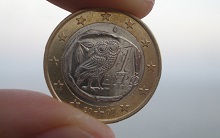Enjoying decades of successful performance, the euro used to defy the odds of divergent national economies. Eurozone countries surrendered their monetary policy to reap the benefits which came with a single currency, from mitigating interest rate volatility, stabilizing inflation and facilitating access to capital to increasing trade volume. Yet today, the euro is seen in a very different light. It is generally regarded as a cause of ill and an obstacle to recovery. Many argue that lower interest rates have fuelled a borrowing frenzy in Europes southern countries, the GIIPS (Greece, Ireland, Italy, Portugal and Spain), which has ultimately left these countries on the brink of default. Others opined that had the GIIPS remained out of the eurozone, they would have had the option to devalue their currency, making their exports more competitive.
There is no doubt that the sovereign-debt crisis has accentuated and problematized major structural differences between the more and the less competitive economies. Yesterday it was Greece that ran into serious difficulties, today it is Ireland, and tomorrow it might be Portugal, Italy or Spain. And what is more, the frail situation of these countries is made even worse, as GIIPS governments are perceived to be unable to enact the painful but necessary reforms (with the exception of Ireland). Domestic discontent and political opposition are exacerbating uncertainty and damping investors’ confidence. Protests have already broken out in Greece and Portugal, and other countries are likely to follow. A by-election result in Ireland has jeopardized the governments hope of passing a painful austerity budget on December 7. This ensuing debt drama has led many commentators to question the viability of the eurozone. Such a view, however, is inaccurate and shortsighted.
The way out of this widely acknowledged mess is to stop blaming the euro for mistakes that are not of its doing. Ironically, what may be termed the sin of the euro was in fact boosting investors’ confidence in countries such as Greece, Portugal and others. With the adoption of the euro, inflation and interest rates miraculously decreased and did so dramatically. At the same time, northern countries benefited from the euro, whose value fared less than the original currencies (as was the case with the Deutsche Mark, for instance). As a consequence, exports from the northern countries were given a tremendous boost. It must be borne in mind that the principle culprit is in fact poor government policy, which has done nothing to prevent housing and construction bubbles and which has succumbed to borrowed money.
In the blink of an eye, GIIPS troubles have become a financial burden and a political problem for Europes northern countries. North European countries are wary of extending a rescue fund to troubled countries. According to a recent poll published by the German newspaper Bild am Sonntag, 53% of Germans want to expel Greece from the euro zone, if necessary, and 67% of those interviewed are opposed to providing Greece with billions of Euros in credit.
If there is a single lesson for policymakers to learn from this crisis, it is without a doubt that much more attention needs to be paid to government finances in the eurozone. Mechanisms need to be put into place to enforce government deficit levels of no more than 3% of GDP and to ensure that gross government debt does not exceed 60% of GDP. But alas, the clumsy way of dealing with the crisis has jeopardized the future of the euro, casting a dark shadow over the European Union project at a critical juncture in the history of global economy.
The rapid economic growth of countries in Asia and Latin America is currently transforming the global economic landscape in a dramatic fashion; such a transformation will have major economic and political consequences for the EU countries. According to an estimate by the Carnegie Center, by 2030 Indias real GDP will surpass Germanys, and Chinas will be larger than the combined GDPs of France and Germany. With the rise of other countries, the global political economy of the 21st century will confront European countries with a host of challenges: currency wars, climate change, trade protectionism, resources competition and multipolarity. In sum, the outlook is rather bleak and unless EU member states pool their resources together, there is nothing ahead but trouble.
No doubt, tough decisions need to be made and decisive actions must be taken in order for the eurozone to survive. However, in the midst of this debt storm, prudent EU policymakers will have to contemplate an answer to the following questionwhat kind of a union do they hope to foster and bequeath to future generations? Let us hope that their answer will be: a united community willing to shoulder the burden of future challenges; not a community inspired by nationalist sentiment. What the EU is lacking today is the political will to move the unfinished union into a fully integrated community. If there is a political will for a truly united Europe, this will create an economic fix for the eurozone.



